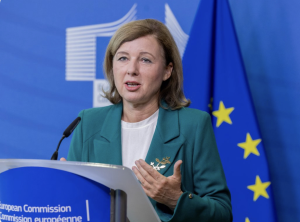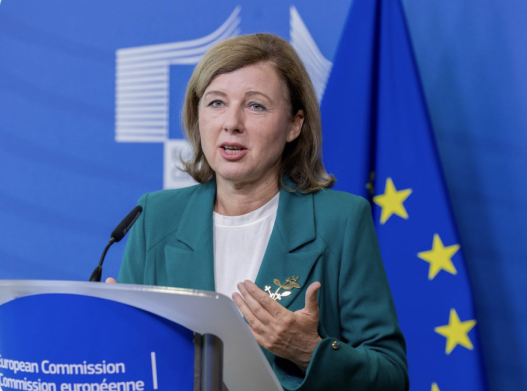
SOCIAL NETWORK X IS WHERE MOST DESINFORMATION IS PUBLISHED, ACCORDING TO THE EUROPEAN COMMISSION
The European Commission (EC) established that the social network X, formerly called Twitter, is the social network where most disinformation is transmitted. One of the most worrying issues is the falsehoods that are disseminated around the war between Ukraine and Russia.
The EC’s conclusion is set out in a 200-page report released on Tuesday, September 26, when the world’s largest technology companies also presented their first report on how they have progressed in implementing the European code of practice against disinformation. This code consists of a series of voluntary commitments signed by platforms such as TikTok, YouTube, Google and Facebook. The social network X was initially included in this group, but last May, its owner, Elon Musk, informed that they were disassociating themselves from this agreement.
Although it has left the pact, X has to implement measures against disinformation because this requirement is part of the Digital Services Law, which came into force on August 25, 2023. This standard is binding for all companies operating in the European Union. And it is the EC that monitors compliance.
The report was presented on Tuesday by the European Commission’s Vice-President for Values and Transparency, Vera Jourová. It is based on a pilot study, developed in Spain, Slovakia and Poland, nations that are now involved in electoral processes.
It concludes that social network X registered the highest ratio of messages with misinformation among sensitive content. It also had the highest proportion of reactions to disinformation content versus normal content. And it turned out to be the one with the highest percentage of disinformation actors within the total number of users, between 8% and 9%.
WHAT ARE PLATFORMS DOING TO COMBAT DISINFORMATION?
Jourová pointed out that the technology platforms that did not break their commitment are indeed taking actions that make a difference with X.
According to AFP and EFE news agencies, as reported, among other media, by El Tiempo31 million in advertising revenue to disinformation actors in the EU and rejected 141,823 political ads for not being able to verify the identity of the funder.
“On Facebook, 95% of users who encounter content verified as disinformation choose not to share it and 37% cancel the action of sharing it when they receive a warning that it is about to spread disinformation, a figure that drops to 29.9% on TikTok.
“The Chinese video platform, on the other hand, reported that it has removed 140,635 videos that violated its disinformation policy and together accumulated more than 1 billion views; Microsoft also prevented or limited the creation of more than 6.7 million fake LinkedIn accounts.”
SPECIAL CONCERN FOR RUSSIA
Platforms that remain subscribed to the EU code of best practice to combat fake news have detected activity directed from Russia. According to Spain’sEl Periódico, the EC report explains that Google has removed advertising from almost 300 web pages linked to “propaganda sites financed” by the Kremlin. Also, YouTube has removed more than 400 channels “involved in coordinated influence operations” and Microsoft has downgraded dubious information in 800,000 queries about the war in Ukraine.
El Periódico stresses that the EU fears that Moscow’ s digital propaganda could influence the elections that Slovakia is holding this Sunday and those of October 15 in Poland.
“The Russian state has embarked on the war of ideas to pollute our information space with half-truths and lies to create the false image that democracy is no better than autocracy,” Jourová denounced.
And while war is a preponderant factor in the dissemination of fake news, the 44 platforms that comply with the EU code of good conduct have also denounced the proliferation of hate messages related to climate change, migration or the rights of the LGTBI+ community, reported El Periódico.


